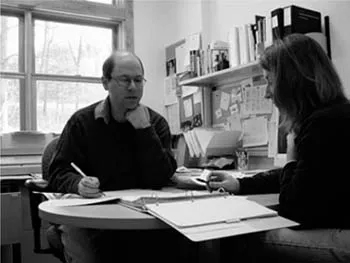![]()
PART I M A N A G E M E N T
I find it vital that any manager can speak intelligently about the art
and be able to respond to it wisely.
—PAUL HENGESTEG,
company manager, Shakespeare Theatre Company
My employees usually know more about their working conditions
than I do. If I don’t listen to them, I’ll never be able to do my job, and
in the end, neither will they.
—MICHAEL BROH,
production manager, American Players Theatre
A manager is a manager is a manager, right? Well, not if you’re referring to managers in the theater. While they do conform to the general idea of most other managers, theater managers, like stage managers, production managers, and company managers are different—and not just because they’re theater folk. You can look at the quotes above for an example of how they are the same and how they’re different. Broh demonstrates the traditionally ideal managerial outlook—one concerned with the conditions of the employees in his charge. Hengesteg, a company manager for almost a decade, shows us how theater managers must be in touch with the art they serve and thus how they differ from the kind of manager you would find lurking around your cubicle. It is the theater managers’ devotion to the art form they make possible that distinguishes them from other managers. It wouldn’t be a stretch to say that the people featured in this section are as much informed by the theater as the theater is informed by them. Just check out what Josh Friedman, another production manager, has to say at the beginning of the first chapter.
Production manager Michael Broh discusses schedules with American Players Theatre production stage manager Evelyn Matten. (Photograph by Sara Stellick.)
This section contains only the three technical theater careers mentioned above, but this shouldn’t be taken as a sign that there are only three management positions in all of technical theater. In fact, you will likely find within these pages several careers that entail a great number of management duties, but the three careers highlighted here in the management section are first and foremost managers of people and information.
Each of these managers is responsible for a very different type of management, as you will see. They all, however, must manage people, and anyone pursuing similar career tracks must develop very good people skills in addition to any other expertise necessary to execute the job. Ask any manager, in theater or out, how important people skills are, and he will give you an earful on the subject, I assure you.
![]()
1
PRODUCTION MANAGER
A strong understanding of the artistic process allows a production manager
to effectively communicate and understand the issues, pressures, and thought
processes of directors, designers, and staff.
—JOSH FRIEDMAN,
production manager, Alley Theatre
A reliable way to determine what theater professionals actually do is to ask them what they say when their second cousin from Peoria approaches them at a family reunion and asks, “What d’ya do for a livin’?” Michael Broh, production manager of American Players Theatre since 2000, has his own canned response. “I say, ‘I’m in charge of all the backstage stuff at the theater—you know, like costumes, sets, lighting, sound, props—that sort of thing,’” he says. “Usually, that’s all someone wants to know. Then they start asking me about actors.” Broh does not exaggerate with his cousin. Each and every person who is a part of the production team, including all of the areas Broh mentions, is under the jurisdiction of the production manager (PM).
Production manager Josh Friedman working the phone—something PMs do frequently.
In short, there is no technical theater without production managers. Even the smallest of theater companies has someone who does the job, though that person may have a different title. Sometimes the title is operations manager, director of production, production coordinator, or supervisor. In some cases, technical directors are responsible for what will be described here as the duties of a production manager. The thing is, the work a PM does must be done by someone, even if no one in the building is called the production manager.
“WAIT FOR THINGS TO GO WRONG”
“I do the stuff that our producing artistic director should not be bothered with,” explains Rafael Castanera, production manager of Arkansas Repertory Theatre in Little Rock. “I really play the role of liaison between our administration and our production staff,” he says. As with most technical theater careers, the duties of a production manager vary from venue to venue, depending on the size, location, and prestige of the theater, among other considerations.
Generally, production managers have a hand in most areas of a theater’s operation but focus primarily on keeping the production team afloat. They coordinate and track budgets, labor, and staff to ensure that every technical aspect of a production and the entire season happens on schedule and within budget in a safe, reasonable manner. They are typically responsible for hiring technical staff, negotiating and drawing up contracts, creating and maintaining production budgets, and scheduling both personnel and stage use. As part of a collaborative effort involving designers, directors, the technical director, the administrative team, and the artistic director, they must decide, on the basis of reasons including safety, cost, and technical feasibility, which technical aspects of a production can actually happen. Ultimately, they are responsible for these decisions because they alone ar...



